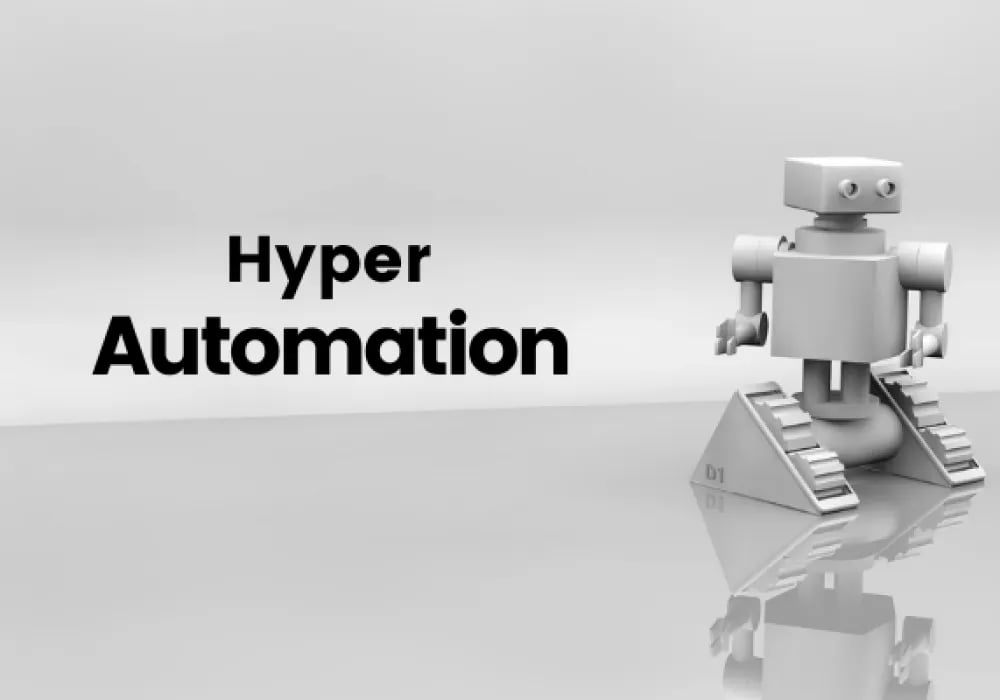Apr 16, 2021
Era of Hyperautomation

Hyper-automation offers robust capabilities and analytical tools that allow human-machine collaboration and improve customer service while reducing operating costs and boosting production output.
Hyperautomation expands through a wide array of tools that can be automated. In other words, it is also described as the sophistication of automation (i.e., discover, analyze, design, automate, measure, monitor, reassess).
In the layman language, Hyperautomation is the blend of Artificial Intelligence and automation technologies. When AI combines with augmenting humans’ capabilities, it enables them to achieve more efficiency to complete processes faster with fewer errors.
General Use Cases or Examples of Hyperautomation Include:
- Understanding emails using NLP (Natural Language Processing).
- Understanding documents using OCR (Optical Character Recognition) capabilities.
- Improving automation flows using ML/ AI (Machine Learning/Artificial Intelligence).
- Stock forecasting and automate restocking.
Common Difference Between Automation and Hyperautomation
Automation is performed using automation tools, whereas Hyperautomation requires multiple Machine Learning packaged software and automation tools. You can consider automation as the simple optimization of task processes, in which you set up a bot to get a series of tasks done.
However, Hyperautomation incorporates an additional layer of robotic intelligence to make the processes smarter. It is not possible for any tool to replace humans. Still, Hyperautomation features a combination of tools, including intelligent business management software, robotic process automation, and artificial intelligence, with the aim of preferring AI-driven decision-making.
With RPA and task-oriented automation, operations can be managed efficiently. On the other hand, Hyperautomation is the sophisticated AI-based process automation to achieve smart and efficient operations-based outcomes. Automation is conducted from one platform. On the flip side, Hyperautomation is an ecosystem of systems, platforms, and technologies. Everything that can be automated will be automated is the main purpose of Hyperautomation. Inversely, Automation is taken into account whenever it is possible or whenever there are chances to automate processes.
As Hyperautomation has an extra layer of intelligence, so it is feasible to involve AI technologies in many forms. For instance,
- OCR (Optical Character Recognition) lets bots convert images to readable texts.
- NLP (Natural Language Processing) allows bots to interpret human speech.
- Machine Learning supports bots to identify patterns in data.
When amalgamated with automation software, such technologies can extend the automation possibilities.
Robots are not here to replace us from jobs, they’re crafted to give us a promotion - the Research Director at Gartner.
Common Example of Automation & Hyperautomation
For businesses who already know the benefits of automation, it might be possible for them to think about automation as an electric beater for whisking eggs that saves much time and offers better results. When you are perfect in using an electric beater and when you’ve got a hassle-free experience, you’ll have no desire to switch to a regular whisk.
Now in the market, the same electric beater comes with an intelligent timer that automatically stops the beater from whisking your eggs when they are completely thick and fluffy. That’s the concept behind automation.
Most businesses that want to work faster and smarter will turn up to Hyperautomation from Automation. No doubt, the automation is good enough to complete the work faster, but when it comes to fully automatic capabilities, Hyperautomation is two times ahead of the regular Automation processes.
Benefits of Hyperautomation
Accelerating Complex Work
Hyperautomation is a high-speed route that engages everyone in transforming the business. It supports more automation and highly complicated work that depends on human information feedback.
Establishing/Deploying Digital Workers
Upskilling intelligence with RPA helps in building an intelligent Digital Workforce capable of assisting employees and managing routine tasks. These digital teams are the change agents of Hyperautomation, with the ability to work with structured and unstructured data. It can connect to several business applications and able to explore automation opportunities and new processes, analyze and make decisions.
What’s more?
RPA and AI are the essential ingredients of Hyperautomation. It also provides a unique advantage by uncovering and automating previously inaccessible data and processes: the development of a digital twin of the enterprise (DTO). A DTO aims to gain visibility for the previously unseen interactions between systems, roles, and key performance indicators.
Which Industries Require Hyperautomation?
- Banking
- Healthcare
- Insurance
- Public Sector
- Manufacturing
- Transport & Logistics
- Media & Entertainment
- Real Estate
- Energy & Utilities
Using Hyperautomation Tools & Platforms – Time to Think Different
Tools and platforms are at the heart of the cloud. To fulfill the growing needs of the business, IT organizations can’t win simply by throwing professionals at the problem. That approach is expensive and challenging to execute. Even, it doesn’t provide a way to operational efficiency and agility. Companies should realize the Power of Applied Intelligence - using automation, analytics, and artificial intelligence to optimize how the company runs, and it also helps experience a significant improvement. A new Agile operating model and cloud, coupled with the increased use of platforms and tools for automation, AI, and analytics – known as AIOps that is becoming core to how we drive operational efficiencies, agility, and cost savings as we revolve around “New IT.”Hyper automation can quickly solve gaps in system resilience:
- Knowledge loss due to unavailability of trained workers.
- Workforce effectiveness and rapid response.
- Project delays moved from app development to maintenance.
- High recovery cost to maintain continuity.
- Technical debt maintenance efforts.
- Business disruptions that trigger business operations.
At the End
Hyperautomation is an unavoidable market state where companies automate a maximum of business processes. Hyperautomation evolved into the market when a conventional RPA found it challenging while automating the process for unstructured data. Choosing Hyperautomation has become the right and more brilliant automation choice to avoid the limitations posed by RPA.
Kanika Vatsyayan
Automation & Manual Testing, QA Delivery & Strategy
About the Author
Kanika Vatsyayan is Vice-President – Delivery and Operations at BugRaptors who oversees all the quality control and assurance strategies for client engagements. She loves to share her knowledge with others through blogging. Being a voracious blogger, she published countless informative blogs to educate audience about automation and manual testing.